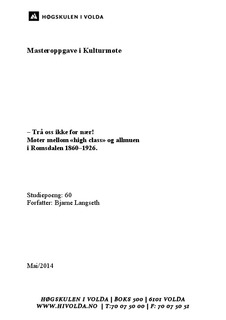| dc.description.abstract | Summary
The following essay will consider the cultural encounter between representatives of the upper class from foreign countries, mainly British citizens, and the local lower class people in the valley of Romsdalen on the western coast of Norway. These encounters came about as a consequence of rich foreigners’ increasing interest in Scandinavia in general and Norway in particular, as they wanted to experience its untouched nature and enjoy the natural resources for fishing, hunting and mountain climbing. In order to achieve this the visitors were dependent on the locals for guiding and all other forms of services in this very inhospitable and inaccessible landscape. In the first chapter of this essay I describe the encounters related to the period from 1860 to 1884, when the farm of Aak was an international hotel. This period I call ”The Quick Encounters”. The second chapter describes the period from 1885 to 1926 when Aak was owned by a British family. This period I call ”Long Lasting Relationships”. The theoretical perspective is mostly based on Pierre Bourdieu’s theories on cultural, social, and symbolic capital, and the concepts of habitus, field or location. I found that the cultural encounter brought with it great advantages for both parties. The visitors achieved their dreams of a different experience of nature, spending summers in a peaceful place while they also got some insight into another culture. The local people learned the English language to varying degrees and got an insight into the British culture. But, first and foremost, the locals got a valuable income to help them feed their families. The encounter between these parties went very well for the most part, but if the upper class people or their way of life was threatened in any way by the locals, they reacted with arrogance and claimed their rights. | nb_NO |
